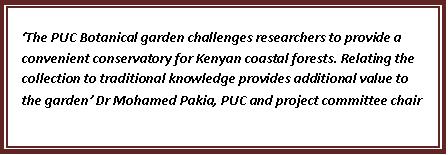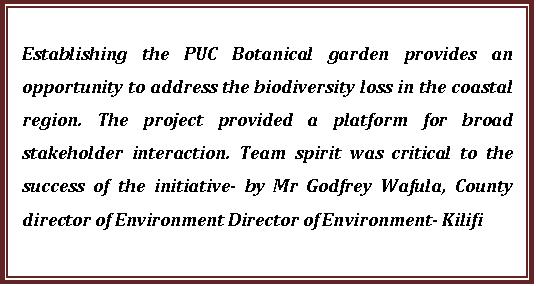RCE Pwani is hosted by Pwani University
NEMA PARTNERS WITH PWANI UNIVERSITY TO ESTABLISH A BOTANICAL GARDEN
The National Environment Management Authority (NEMA) has partnered with Pwani University College (PUC) to set up a Botanical garden at the University. This was done under a partnership framework in which NEMA has been working with PUC to promote both environmental education activities and the goals of the UN Decade of Education for Sustainable Development (UND ESD 2005-2014). This project is also in tandem with the PUC mandates of research and community outreach. The garden is grounded on four pillars namely Education, Research, Recreation and Conservation. The funding support for the project was from the NEMA sub-component of the Danida funded Natural Resource Management (NRM) Programme The PUC Botanical Garden comprises the entire College compound but with a defined concentration area – the dam site. At that site thematic segments have been developed, and include: medicinal garden, wild-food plants garden, cosmetic and ornamental plants garden, rare and endangered plant species garden. Specific activities in this project included:
- The setting up of the garden entailed purchase of seedlings, site preparation and planting and general maintenance of the garden. Specific activities included;
- Making of tracks
- Clearing, purchase of implements, and stone laying along the side of tracks
- Labeling: Sign board at the entrance, Labeling of individual tree species, Labeling of thematic areas (to designate spaces for wild food plants, medicinal plants, cosmetic and perfumes garden, succulent plants, timber plants, flowers and colours garden , grass garden and the systematic garden)
- Enrichment planting in thematic areas
Tree seedlings of varied species from selected thematic areas were procured to increase the diversity of species based on the value, ecological areas and its conservation status. Over 200 hundred high value tree seedlings representing varied species have been planted. Key Areas to Benefit from the Botanical garden
Research
The research conducted will help to provide solutions to environmental, medical, social, and resource utilization challenges facing the Coast Region, for faster realization of the goals of Vision 2030 of the Kenya Government (PUC Strategic Plan 2010 - 2020). This component will encompass domestication of some of the wild plant species
 Community outreach
Community outreach
The established garden is expected to foster closer working relationships between the university and the local community. The latter are expected to utilize this facility for recreational purposes, cultural activities, and wedding ceremonies. By tapping into the indigenous knowledge of the local people in the establishment of this facility it opened up opportunities for co-learning between the university and the communities where the flow of knowledge is two-way and not uni-directional
Education
The garden is expected to bolster educational programmes within the university and its environs. Environmental education, biological sciences, and agriculture-based programmes will be key beneficiaries. The garden is also open to school parties 9primary and secondary school) from the county Within the Education for sustainable Development (ESD) context this project enhances several important aspects including strengthening of networks, respect and care for the community of life, ecological integrity, learning to live together, learning to know and learning to do. This is especially important considering that the coastal region is a multi-ethnic one and has been rocked by conflict in previous years The project was an enriching experience for the whole project team as evidenced by the testimonials
 Some possible future actions include;
Some possible future actions include;
- Consultative Workshops with with traditional healers
- Registration of Healers and Healer groups
- Development of a working agreement between the University and herbal medicine Practitioners
- Enriching PUC Herbal garden while simultaneously helping herbalists develop their own gardens
- Research in toxicity and safety, efficacy and dosage of the curative claims
- Value addition on herbal medicine (improving resource availability, improving processing and packaging, and improving precision in use and dosage)
- Consideration of patents and registration processes for selected medicines
The project was implemented by a combined team of NEMA and PUC staff made up of Dr Pakia Mohamed – Chairman (PUC); Dr Maarifa Mwakumanya – PUC and Coordinator Pwani RCE Pwani*; Dr David Mburu – PUC and member of Pwani RCE; Dr Najjya Mohammed (PUC); Mr. Godfrey Wafula – NEMA County Director of Environment, Kilifi county; and Mr. Billy Nyaare – NEMA
*A Regional Center of Expertise is a network of institutions working together to achieve the goals of the UN Decade of Education for Sustainable Development (ESD) by formulating local solutions for local sustainable development challenges
Article submitted by David ongare, Deputy Director Environmental Education/ Danida-Natural Resource Management Programme Manager




 Popo Road,South C, off Mombasa Road
Popo Road,South C, off Mombasa Road P.O.BOX 67839-00200, Nairobi. Kenya
P.O.BOX 67839-00200, Nairobi. Kenya Mobile: 0724 253398, 0735 013046.
Mobile: 0724 253398, 0735 013046. Email: info@nema.go.ke
Email: info@nema.go.ke